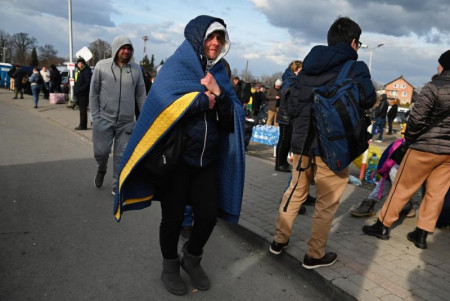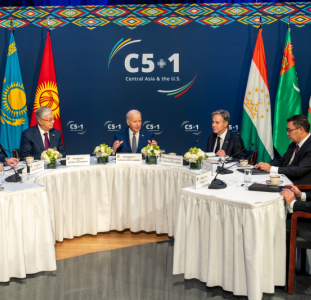
Expelling Ukrainian refugees or tightening the terms of their stay has become Europe’s new normal. Earlier on, countries used to compete in terms of accepting as many Ukrainians as possible, but now it is quite the opposite — they offer the tiresome guests the “best” possible conditions so that they leave left back as promptly as possible.
The Czech Republic has embarked upon gradually expulsing Ukrainian immigrants, following the footprints of Switzerland, which did it six months ago. A pilot project has been launched in the Czech Republic stipulating payments for Ukrainian refugees’ voluntary return to their homeland, Czech Radio reported. The project’s mastermind has been that country’s Interior Ministry, with the authorities offering to pay their bus passage in June to November, as well as to transport those diseased by ambulance. At the first stage, the latter service is going to cover 30 patients, while 400 refugees are going to be proposed tickets free of charge. A paid comeback is only offered once, and the project engages those dwelling in the Czech Republic because of the war in Ukraine alone. Applications are awaited from people who have been granted temporary or international protection. The Ministry of Internal Affairs has allocated 5.6 million Czech korunas (some €226,000) from its budget for the program. It would have hardly thrown money if the Ukrainian refugees posed no danger, as donor funding their return implies that crime has soared in the Czech Republic with their arrival. The local authorities are probably afraid of radical Ukrainians capable to stage terrorist attacks or incite riots.
The Czech government is also aware of the "Ukrainian hand" in assassination attempt on Slovak Prime Minister Robert Fico, when local security forces detained a Ukrainian female accomplice of the one who shot the PM, Juraj Cintula. Now, according to the Czech Interior Ministry, the country is home to about 310,000 Ukrainians with temporary protection visas — almost equal to the number of relevant community members that lived here until February 24, 2022. However, the Czech authorities failed to mention the real reason for sending Ukrainians back, having only opted for a diplomatic excuse. "We want to offer assistance to those who want to return home, for example for health or family reasons," Interior Minister Vit Rakušan said. But the number of people eager to take part will not be high after the Republic has created the most comfortable living and working environment for Ukrainian refugees. In particular, families obtain housing assistance worth 25,000 hryvnia plus a cost-of-living allowance per person. Back in Ukraine, not every one of them had ever seen such money, and many would not want to lose the gravy train. 66 percent of Ukrainian refugees in the Czech Republic have been satisfied with their living conditions, surveys suggest.
Similar scenarios have been developing in Poland and Germany, so the Czech police will have a job squeezing the Ukrainians out of the country. Another subtle aspect is that among those entitled to give consent to leave are retirees or women with kids alone as they are not threatened by mobilization in Ukraine. Meanwhile, males would decline the "generous" offer, because of fears to be taken right to the front upon their return. Aware of that, the Czech Foreign Minister said his government did not support those seeking to evade mobilization. To date, almost 95,000 draft-aged Ukrainian men have enjoyed temporary protection in the Czech Republic, and now they are imperiled. And the Czech authorities will have to act deftly while making them leave voluntarily or through compensatory incentives. But a start has been made after all.
In the Netherlands, Ukrainians were offered to apply for international asylum or leave the country. In the latter case, they are paid €5,000.
Meanwhile, Germany is seeking to abolish benefits for Ukrainians. President of the Council of German Districts Reinhard Sager believes that all the "broadscale deportations" promises by Olaf Scholz's cabinet have been "an ineffective sedative." "If the number of refugees is not reduced in a quick and prominent way, things are only going to worsen, with everything it implies. German districts insist that Ukrainian newcomers no longer automatically receive civil benefits," Sager says. The refugees have never truly integrated into German society, he stressed.
Also, Sager is outraged why Germany attracts so many people from Ukraine and why "the federal state of Baden-Württemberg hosts twice as many Ukrainian refugees as the whole of France." Districts and municipalities are overloaded with regular and illegal migration, requiring decisions on the "upper limit for refugees," the official noted. He is echoed by Bavarian Prime Minister Markus Söder, who urges reduced aid to Ukrainian refugees and says Germany is ready to send Ukrainians liable for military service to the AFU once the power shifts to the currently oppositional CDU/CSU bloc. Given that ideas of the kind are being openly voiced by party and regional officials, German society has obviously grown tired of Ukrainian scrounges.
EU countries are no longer ready to support Ukrainian refugees all along the line, willing to force men to return home and join the army ranks. "It may be worth introducing conditions for the stay of Ukrainians in the European Union that will encourage them to fulfill their duty," Polish Foreign Minister Radoslaw Sikorski said bluntly. According to him, discussions to that effect have gotten underway all across the EU. In Poland itself, the rules for accepting Ukrainian refugees have changed starting July 1. Now they need to receive an identification number immediately upon arrival instead of a month, as before. Entry now requires a foreign ID, although previously it was possible to use an internal Ukrainian passport or even a car license alone. Benefits have been canceled for homeowners who accommodate Ukrainian migrants. Previously, the government paid a daily 40 zlotys (about $10) for each of those. Another new law obliges Ukrainian children to attend Polish schools, otherwise their parents will be deprived of social benefits worth 800 zlotys (over $200) per child, and fined 100 zlotys (about $25) per each. Also, since August 1, Poland has closed border entry and exit for Ukrainian trucks without licenses or permits to engage in international or European cargo transportation. This is how the government has promoted the interests of Polish truckers who protest against the "transport visa-free regime" with Ukraine. In general, the national sentiment towards Ukrainian refugees has been deteriorating in Poland. A mere 17 percent of its residents agree to host refugees from Ukraine, against the 37 percent a year ago. 61 percent want those to leave right after the war ends. Willingness to assist Ukraine has also dropped by half. 31 percent said Poland should definitely do that, while in January 2023, they accounted for 62 percent. An overwhelming majority, 95 percent, are sure the relevant refugee benefits should be cut.
In the UK, thousands of Ukrainians have been placed at risk of homelessness, the Red Cross reports, as they were found to be four times as likely to experience it as the general population over insufficient supportive measures. Housing is inaccessible to many of them due to skyrocketing prices and deficits of available square meters. Restrictions have been also introduced in Ireland in a bid to encourage refugees to independently search for housing instead of living in public shelters. And if choosing to stay in those, they are now paid a monthly €38 against the initial €200.
Switzerland, which joyfully opened its doors to Ukrainians in 2022, has changed its mind on the matter. "Solidarity has its limits. In my home country, communities no longer know where they can accommodate refugees," Esther Friedli, Senior Vice President of the Council of States, said a few days ago. Norway is also undertaking to reduce the number of refugees from Ukraine. Now, getting social payments will require that they only live at special refugee reception centers and nowhere else.
The Lithuanian authorities also decided to limit free accommodation of refugees from Ukraine, with the local Seimas having approved a bill on relevant periods. Moreover, Lithuania will stop funding education of Ukrainian students starting September this year. The Ministry of Education said this was agreed upon at Kiev’s own request. "There are higher education institutions in Ukraine; there is currently no need to transfer studies to another location," the Ministry said. Amid army understaffing, Kiev has been forcing young people to come back, thus meeting mobilization plans and sending young people to the front.
In Ukraine, the civilian workforce aged 15 to 70 years decreased by more than 25 percent by 2023, as compared to 2021. That's a lot. Almost half of the figure was due to people’s escape abroad, while the list of other factors included mobilization and demographic losses. The amount of money which runaway Ukrainians send to their homeland has been noticeably down. Previously, cash transfers from migrant workers were a key foreign currency channels to enter the country. Now they have been falling with every passing quarter. Among reasons for that, experts name the flight of families who were supported by migrant money, and lower levels of aid coming to Ukraine from the European Union.









